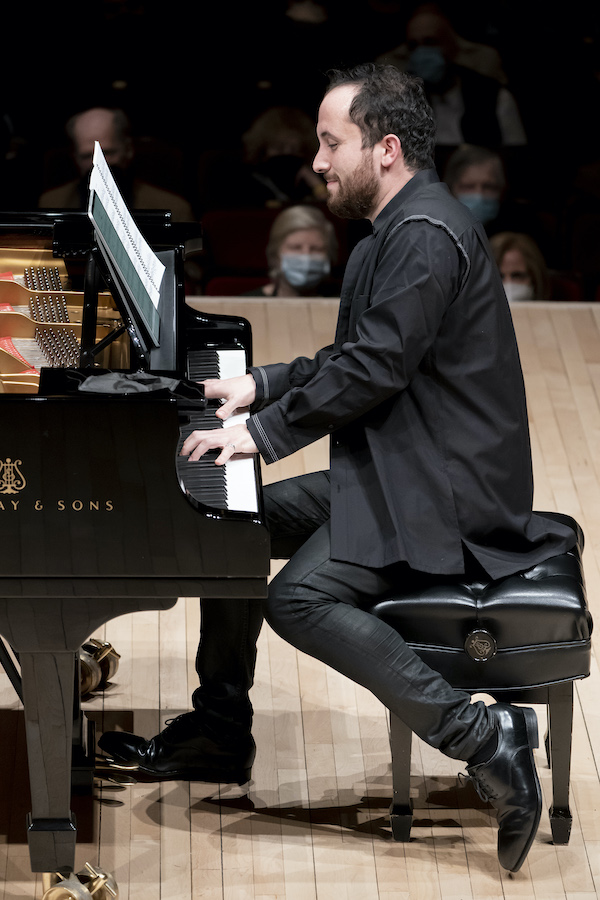Levit mixes insight with indulgence in Carnegie Hall recital
Pianist Igor Levit was already a star when the pandemic hit in 2020. During the time when concerts were cancelled and so many were confined under the anxiety of uncertainty, his concerts streamed from his own home turned him into a hero. But a star or a hero is still a human being with talents and foibles. Levit’s music making can be stupendous one moment and discouraging the next.
Appearing in front of a live audience again Thursday night in Carnegie Hall—playing Beethoven, Wagner, Liszt, and a world premiere from Fred Hersch—Levit again showed that he is something of a Superman, with his core both a source of strength and a kryptonite-like weakness. His intensity delivered extraordinary stretches in the opening piece, Beethoven’s Piano Sonata No. 30, and throughout the finale of Liszt’s Piano Sonata in B Minor. But it also made for disappointing results in Fred Hersch’s Variations on a Folksong and Zoltan Kocsis’ arrangement of the Prelude from Wagner’s Tristan und Isolde.
Performers on this level have healthy egos, the kind that give them the confidence to present their ideas to thousands of paying listeners. In this, Levit is on a par with peers like Yuja Wang and Daniil Trifonov. But where those two musicians give the impression of wanting to share their own appreciation for the music they are playing, of reaching out to the audience to bring them in, Levit opens a window into his internal thoughts and expects us to look inside. This is not necessarily wrong or right, but it is acutely personal; success or failure gets balanced on the instantaneous reaction of the listener to what Levit is like from moment to moment. High reward and high risk.
Beethoven’s Op. 109 Sonata delivered both. Through the first two movements and partway though the finale, one immediately and confidently anticipated a once-in-a-lifetime concert experience. Piano Sonata No. 30 already sounds like one is opening the door into a room where the music has already started, but Levit’s playing at the start was unbelievably gentle and subtle, the music appearing as if from another dimension with a balance of weight and quiet that one would have thought impossible. There was the momentary illusion that Levit was motionless while the music came by itself from the piano.
The effect was extraordinarily beautiful. But beauty can be a trap for Levit. He becomes so enthralled with the sound of his own playing that he becomes solipsistic and loses the poetry for a dry and obsessive concentration on each note. His technique and sound were never less than immaculate, but as the variations of the final movement went along, it increasingly felt like he was testing out a piano in a showroom, relishing the instrument but forgetting the point of the music. This was not bad in an objective sense, but it was an uneven journey from the opening peak.
The descent to pedestrian territory continued with Hersch’s new work. Hersch is one of the finest jazz pianists on the scene, and has written several strong, non-jazz works. But those have been short pieces, and his new variations on “O Shenandoah,” showed that he doesn’t have a grasp on large form. The original tune is of course lovely, and Hersch reharmonizes it with subtle sophistication. But the first variation is a modulation that seems so random that it is off-putting.
Which was the problem for the whole piece. Despite Levit digging deep into the music, each variation seemed disconnected from the next. With no clear form, the music seemed both too short—no variation developed much beyond a declarative statement—and too long, with too many components. Levit finished with a dramatic gesture which seemed forced, and the piece ultimately felt so shapeless that even the coda felt arbitrary.
After intermission, Levit played the second half as a continuous set connecting Wagner (through Kocsis) to Liszt.
The Prelude performance was terrible in the way that only a great pianist can be terrible. It was self-indulgent in the extreme, with Levit spacing chords with such geologic languor that there was no harmonic tension or musical drama. Without those, why play this, some of the most harmonically tense music in Western history?
There was plenty of visual drama though, and one felt this was both overly indulgent and pandering to the fans. And fans they were, with a good number of people applauding during his playing in the Prelude because he had struck a dramatically still pose. There was also a lot of non-listening all evening, with the greatest number of disruptions from ostentatious electronic devices one has heard in the concert hall this season, although one must give credit to the sheer variety of sounds produced.
But after this nadir came the other summit, an astounding performance of Liszt’s sonata. The sheer torrent of musical details, their pace and density, means that just playing the thing is meaningful, and Levit’s clarity of direction and articulation were superhuman. Just below the surface and even more impressive was how secure his rhythms were, every note having a precise relationship in time with every other one.
That’s technique but the artistry came through in how relatively plain his playing was. In the context of Liszt, this dryness was a tremendous benefit. The music is already so full of gesture and drama that giving it both the utmost clarity and strength meant hearing it absolutely refreshed. One had the rare experience of hearing Liszt, without showmanship, as the composer he was. And that made for an exhilarating and extraordinary experience.
Called back for an encore, Levit dipped into the roots of the second half, playing Liszt’s arrangement of the “Liebestod” from Tristan. After the previous indulgences and heights, this straightforward, delicate, highly un-Lisztian performance was charming.
Violinist Maxim Vengerov and pianist Simon Trpčeski play Mozart, Prokofiev, Saint-Saëns, and Franck, 8 p.m. January 20. carnegiehall.org
